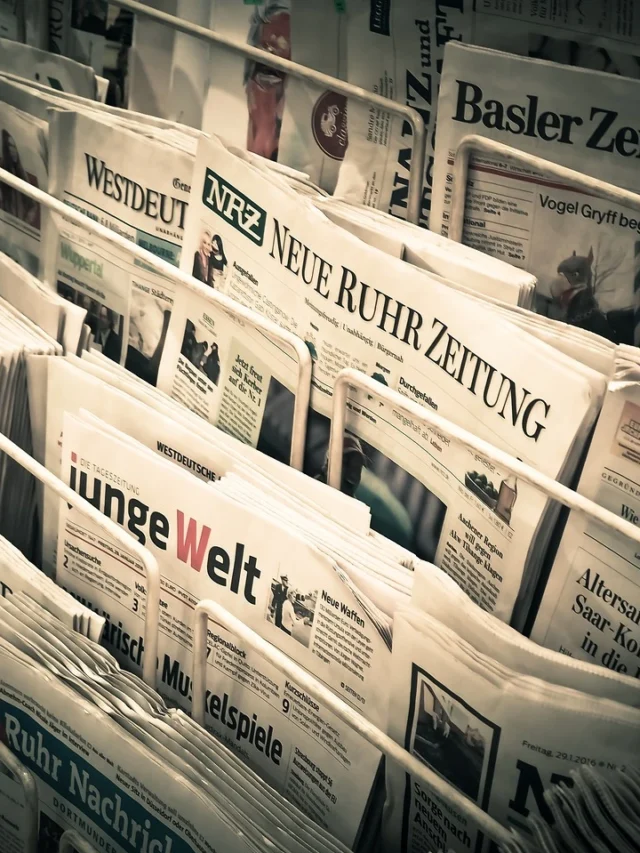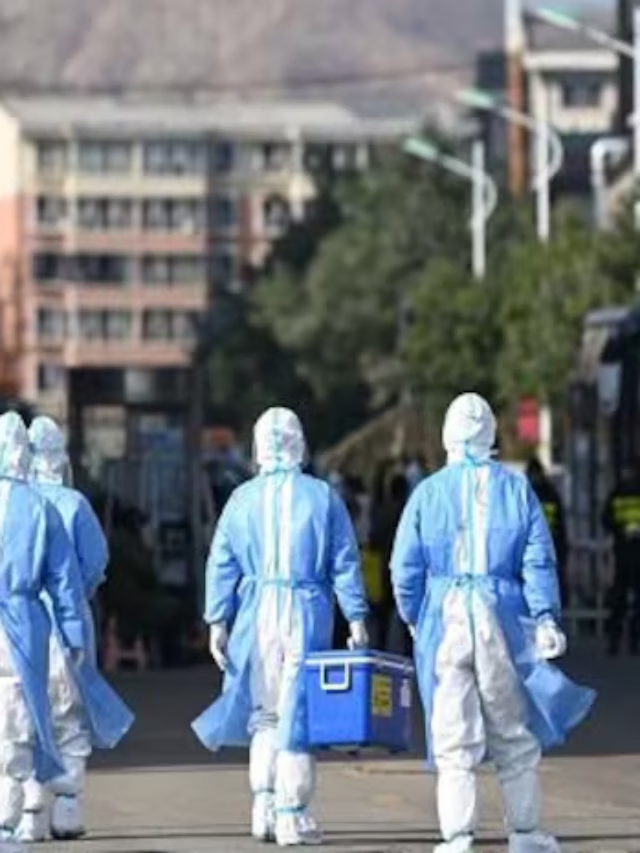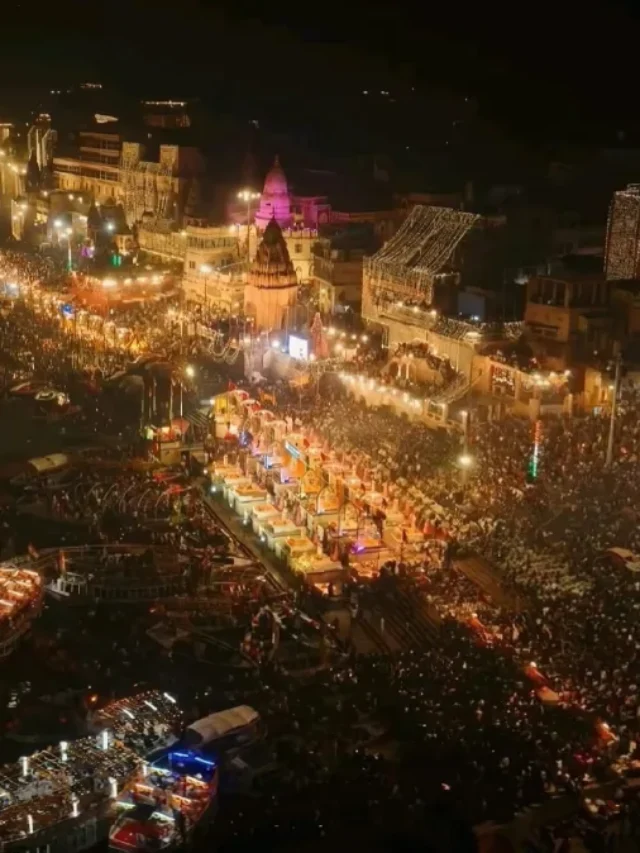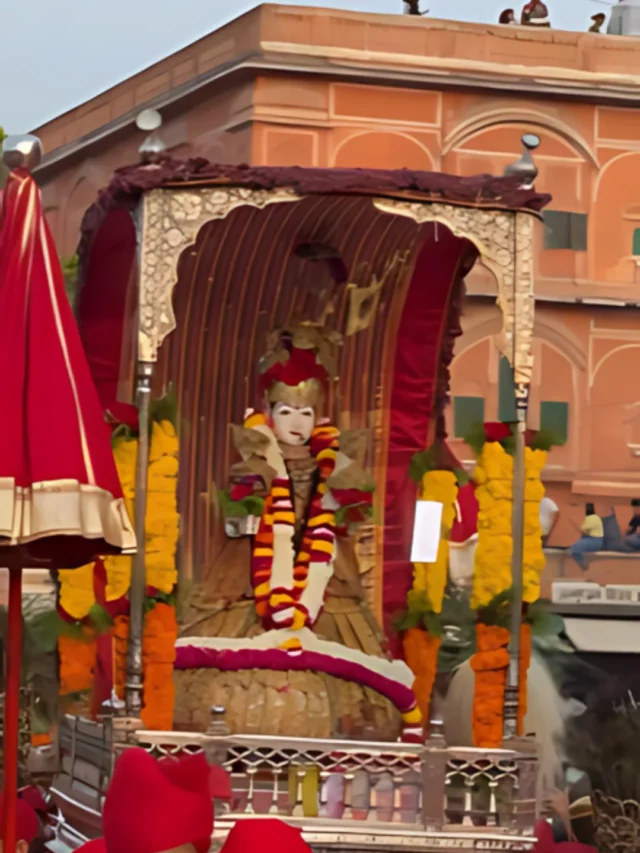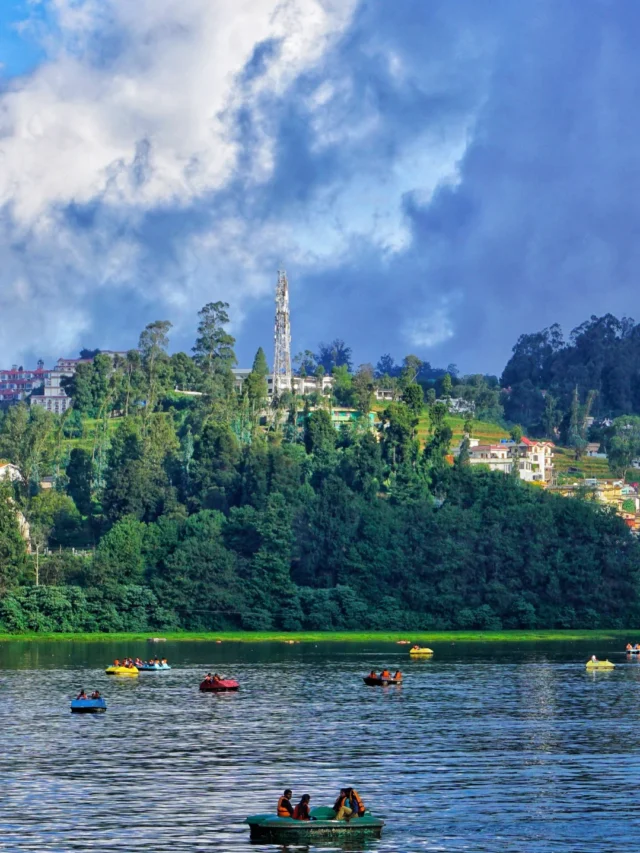Welcome to a majestic voyage into the centre of Rajasthan, where magnificence and history meet at Jaipur’s famous City Palace. This architectural marvel, tucked away amid the vivid Pink City scenery, reminds us of the regal splendour that formerly characterised the area. Prepare to be swept back in time as soon as you enter the City Palace Jaipur, where every inch of the building is decorated with an extraordinary fusion of Mughal and Rajput elements.
Take a virtual tour with us as we reveal the tales behind the imposing gates, regal courtyards, and fascinating artefacts, making this a fascinating place for history buffs and lovers of magnificent architecture. Explore the enduring charm of this magnificent marvel, where each hallway carries echoes of a bygone era.
The Vibrancy of City Palace Jaipur
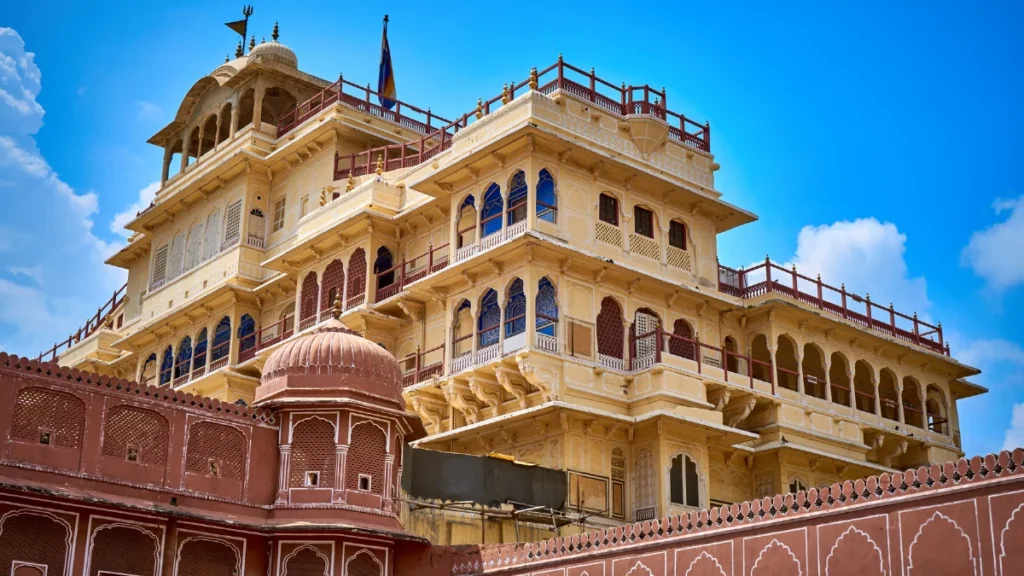
Enter Jaipur, a city that allows the Rajput era to unfold smoothly before your eyes. The location, adorned with architectural wonders, entices visitors year-round with the promise of a historical experience. Symbolic of Jaipur’s royal heritage, the beautiful City Palace is at the centre of this majestic city.
Standing as a beacon of history and magnificence, the City Palace is a living witness to the city’s grandeur. Time appears to stop when you pass its doors, and the palace’s utter magnificence enthrals you. Admire the elaborate building that narrates historical events and discover the wealth of artefacts. Today, the City Palace in Jaipur, formerly the royal palace, reveals its rich history in two sections. In one area are museums and courtyards that offer a lively display of the city’s history. The other is still the royal family’s private residence, with the regal aura resonating within its walls.
Who Built City Palace, Jaipur? – The Regal History
Enter the enduring charm of City Palace Jaipur, a tribute to Sawai Jai Singh’s imaginative spirit as the city’s creator and the head of the Kachwaha Rajput Clan. The 17th century saw the palace’s magnificent ascent, intended to be his royal dwelling. Motivated by a want to move the state capital from Amber to Jaipur, Jai Singh assigned architects Vidyadhar Bhattacharya and Samuel Swinton Jacob with the assignment.
These architects skillfully combined Rajput and European ideas to create a captivating design tapestry as the sun shone its golden colours over the building site. The end product was a stunning architectural wonder that was a tribute to cultural fusion and functioned as a royal dwelling.
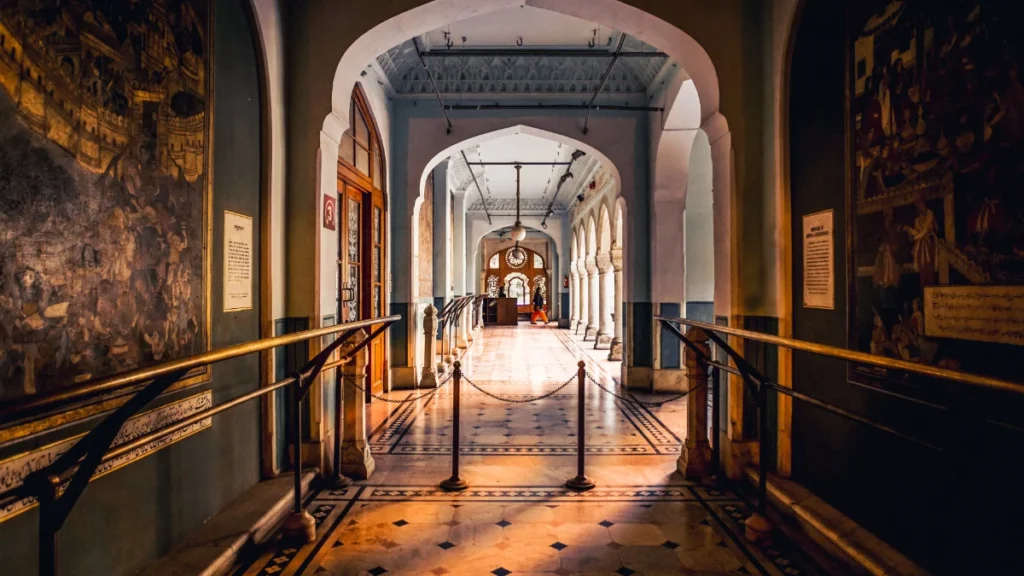
The last of this great dynasty, Raja Man Singh II, sat on the throne amid the lavish halls of the City Palace. Resonating with stories of imperial magnificence, the palace took on the essence of a bygone period, with every courtyard and chamber reverberating with the footsteps of history.
Today, you will be engrossed in a story told through art, architecture, and the very stones that have stood the test of time as you wander around the halls of this magnificent castle. The City Palace, with its elaborate architecture and majestic atmosphere, transports you to a bygone era where Sawai Jai Singh’s legacy and the creative talents of Bhattacharya and Jacob converge in a perfect dance of time and culture. It is more than simply a palace; it is a living representation of Jaipur’s rich past and a call to explore the historical corridors and take in the opulence of bygone times.
The Regal Architecture of the City Palace Jaipur
The outside wall of the City Palace was built first, and throughout the years, buildings and courtyards were added, making it a tribute to Maharaja Jai Singh II’s architectural vision. Every building in the palace has a unique timestamp that tells the tale of its development and evolution.
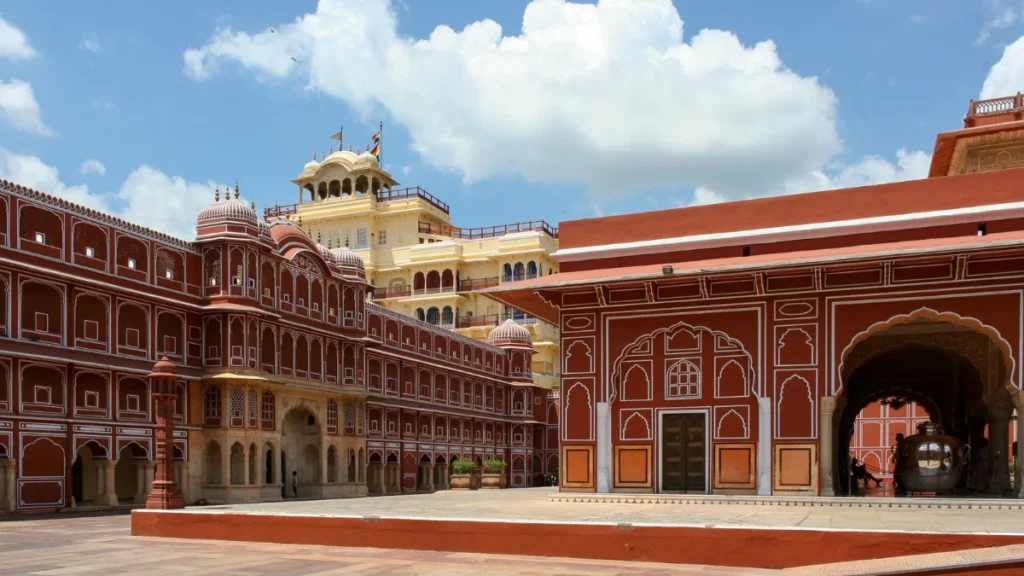
The striking blend of Rajput, European, and Mughal architectural styles, crafted from vivid red and pink sandstone, results in an architectural masterpiece. Large courtyards are encircled by smaller palaces with elegant arches, creating a mesmerising scene. These modest palaces, turned into museums, invite visitors to discover the fascinating past housed inside. Discover the many eras in the palace’s construction by taking a guided tour or exploring at your own pace.
Relics from the past appear as you move through the courtyards: colossal statues and cannons that beg you to stop and try to capture their historical essence. Moving from one courtyard to the next is like taking a trip through time, with each step revealing more of the palace’s rich history. Remember to take in the magnificent building that greets you when you enter the City Palace’s regal embrace as you walk through the front gate.
Exploring the Depths of City Palace Jaipur
Mubarak Mahal
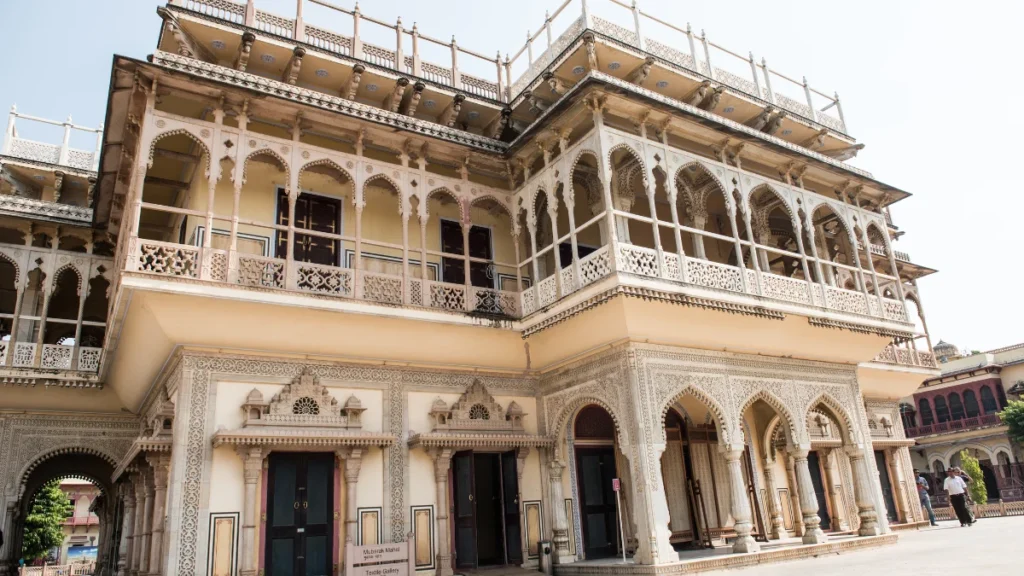
Mubarak Mahal, a magnificent fusion of Islamic, Rajput, and European architectural forms, adorns the City Palace with a timeless elegance. This late 19th-century building, originally designed as a receiving centre by Maharaja Madho Singh II, is now a museum offering an engrossing trip through time. The rich tapestry of artefacts, such as finely embroidered shawls, Sanganeri block prints, silk saris, Kashmiri pashminas, and royal formal clothes, are housed in this architectural jewel. The elaborate garments that Sawai Madho Singh I wore are especially noteworthy as they depict the imperial magnificence of the Rajput period. The displays in Mubarak Mahal’s hallways transport you back in time and entice you to experience the splendour of a bygone period, where each piece of clothing and artefact reveals a different tale about the rich cultural legacy inside the City Palace.
Pritam Niwas Chowk
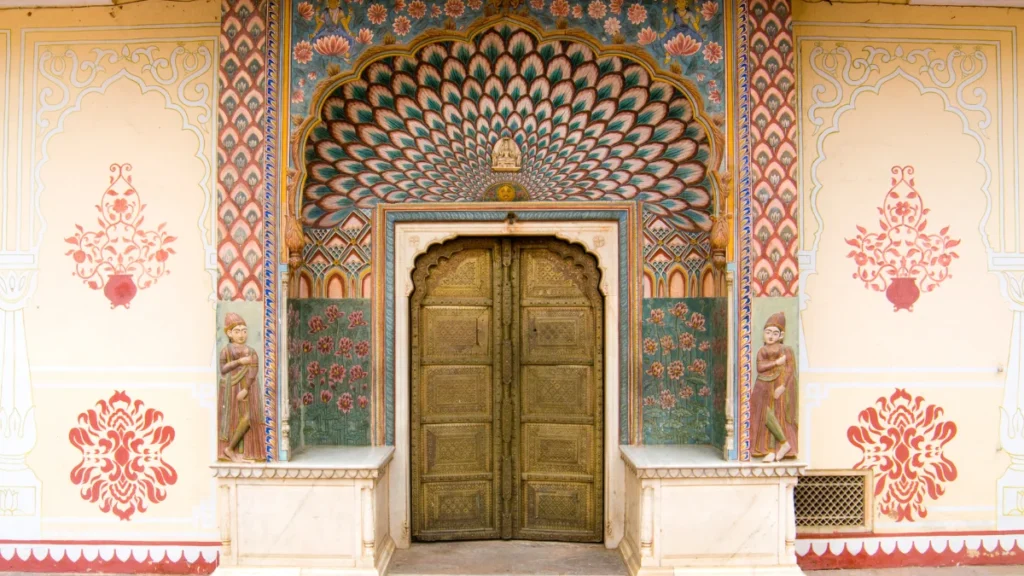
Tucked down in the innermost recesses of the City Palace, Pritam Niwas Chowk is a fascinating haven that serves as a doorway to the Chandra Mahal. This courtyard, anchored by four elaborately decorated gates, is an intriguing intersection of art and history. Every gate, a work of art in and of itself, is adorned with vivid pictures that honour esteemed Hindu deities and capture the spirit of the four seasons.
Enchant yourself as you go through this majestic area with the vibrant representations of Lord Vishnu, Lord Shiva-Parvati, Lord Ganesha, and Goddess Devi that adorn the gates with sacred meaning. The Pritam Niwas Chowk is a visual feast where spirituality and artistry meet to form a cohesive tale, not just a passage. It’s an invitation to enter a world where each gate serves as a gateway, leading to the heavenly and seasonal domains that characterise the cultural diversity found in the centre of the City Palace Jaipur.
Baggi Khana
Located inside the City Palace, Baggi Khana is a museum that offers a wealth of information on transportation history. Experience the charm of a bygone period by perusing a magnificent assortment of antique carriages, palanquins, and European taxis. This exceptional collection attests to the extravagant travel choices of the royal class.
The rare Victoria Baggi diamond is one of the noteworthy artefacts kept here. This exquisite carriage, which the Prince of Wales gave to the royal family in 1876, represents regal refinement. Its historical relevance and elaborate design offer insight into the cross-cultural interactions that shaped the aristocratic way of life.
Every carriage and palanquin at Baggi Khana recounts tales of a bygone period when grandeur and practicality coexisted in transportation. This museum invites you to experience firsthand the opulence of a bygone period with a fascinating trip through the history of royal transportation.
Govind Dev Ji Temple
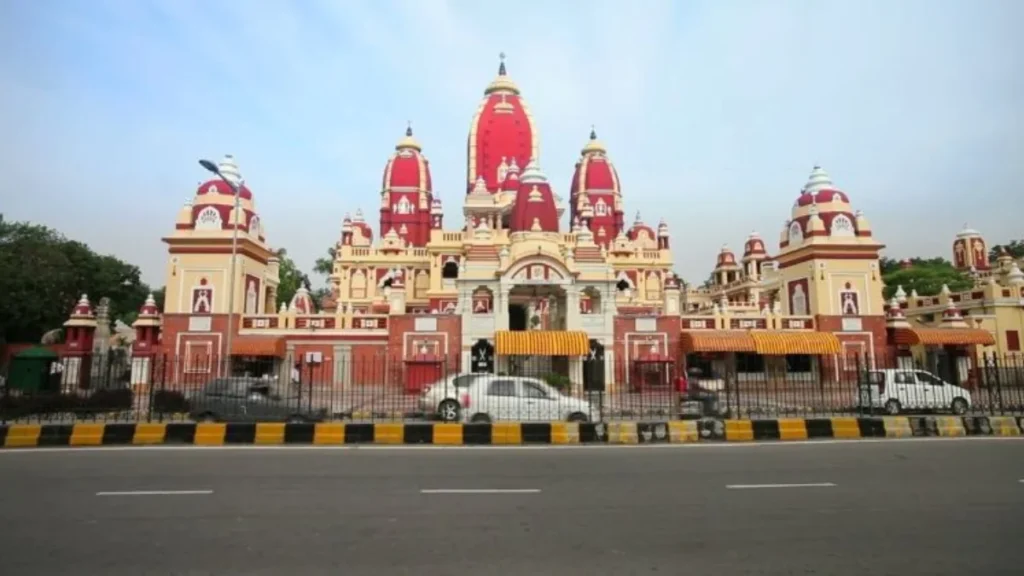
Admire the celestial charm of Govind Dev Ji Temple, a holy sanctuary devoted to Lord Krishna, tucked away a little outside the boundaries of City Palace. The temple’s strategic location provides a magnificent vantage point from which visitors and devotees alike may view the holy statues from the lofty heights of Jaipur’s City Palace.
A magnificent vision appears before you as you climb the palace, the temple acting as a spiritual lighthouse against the vivid backdrop of Jaipur. Devotees find comfort in the calm atmosphere of the temple, where Lord Krishna is present. In addition to adding to the temple’s significance, its location offers a singular and breathtaking view of the sacred space from the lofty heights of the City Palace.
Experience a harmonic fusion of architectural magnificence and spiritual devotion at Govind Dev Ji Temple, where panoramic vistas and divine connection come together to provide a sublime encounter with the spectacular and the holy.
Diwan-e-Aam
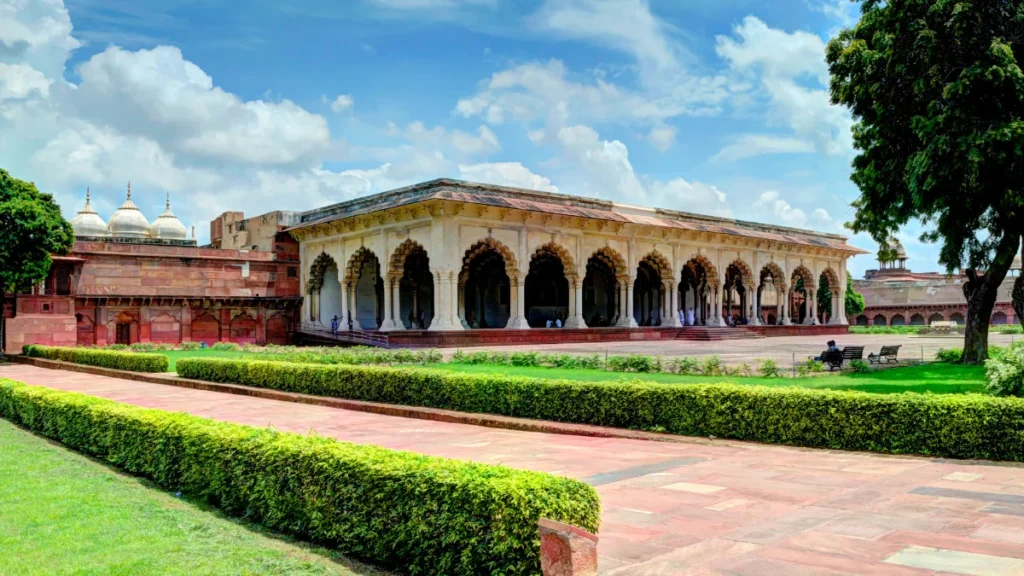
The Diwan-i-Aam in the City Palace is the Hall of Public Audience, tucked between the art museum and the armoury. It welcomes guests to enter a room rich in historical significance. The floor creates the mood for an extravagant encounter with its shimmering marble decorations. Among the notable items on show are two incredible sterling silver containers, each with an incredible 4000-litre capacity. When Maharaja Sawai Madho Singh II used these boats, they had a special purpose: they transported water from the sacred Ganges to give the Maharaja a taste of home when visiting England. The Diwan-i-Aam is home to physical artefacts that tell stories of imperial grandeur and cultural convergence, in addition to resonating with the footsteps of history.
The shimmering presence of crystal chandeliers adds even more elegance to this large hall. These magnificent lights are hidden on ordinary days, but they cast their radiant light around the room on special occasions. The Diwan-i-Aam is a living reminder of the magnificence and diverse history of the City Palace in Jaipur, complete with its exquisite marble floors, ancient relics, and the dazzling spectacle of crystal chandeliers.
Diwan-e-Khaas
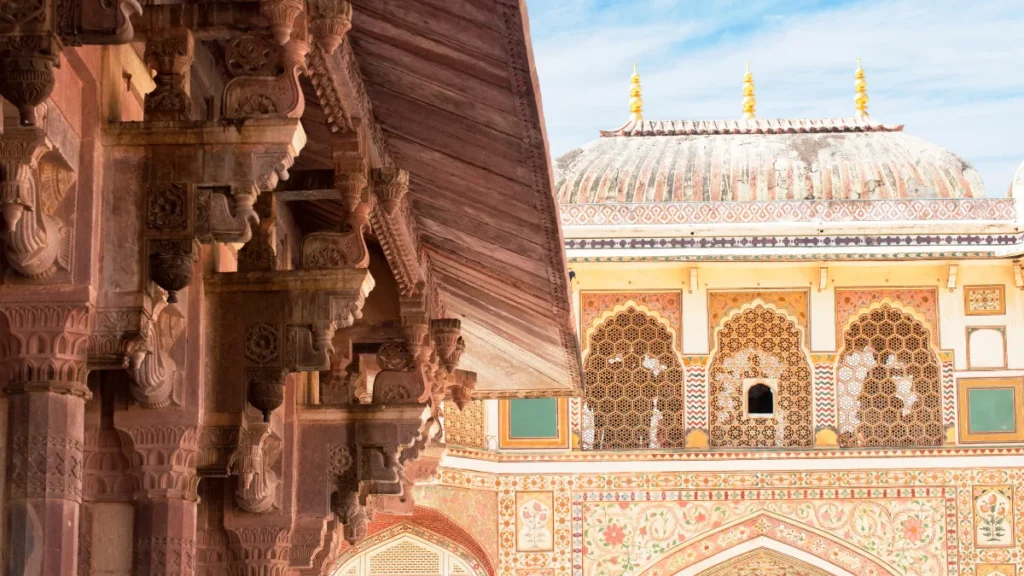
Experience the majestic setting of the royal darbar, where the Maharaja used to have secret meetings with his noble courtiers. To protect the sacredness of this ancient place, photography is politely forbidden in this area of the palace, creating an exclusive world. ‘Takht-e-Rawal,’ the grand royal throne, is the hall’s focal point. It is accompanied by seats that support the weight of court deliberations. The ceiling above is decorated in an exquisite combination of crimson and gold, forming a visual tapestry that reflects the splendour of the royal court.
This hall’s walls are a historical exhibition with life-size portraits of Jaipur’s Maharajas. Ancient writings, beautiful paintings, woven carpets, and handwritten genuine manuscripts of Hindu scriptures are all nestled inside elaborate frames, adding to the space’s rich cultural tapestry. Inside the royal darbar, you are not only experiencing history but also part of a material heritage where the sound of royal dialogues and the visual grandeur of artwork combine to tell the narrative of Jaipur’s royal past.
Chandra Mahal
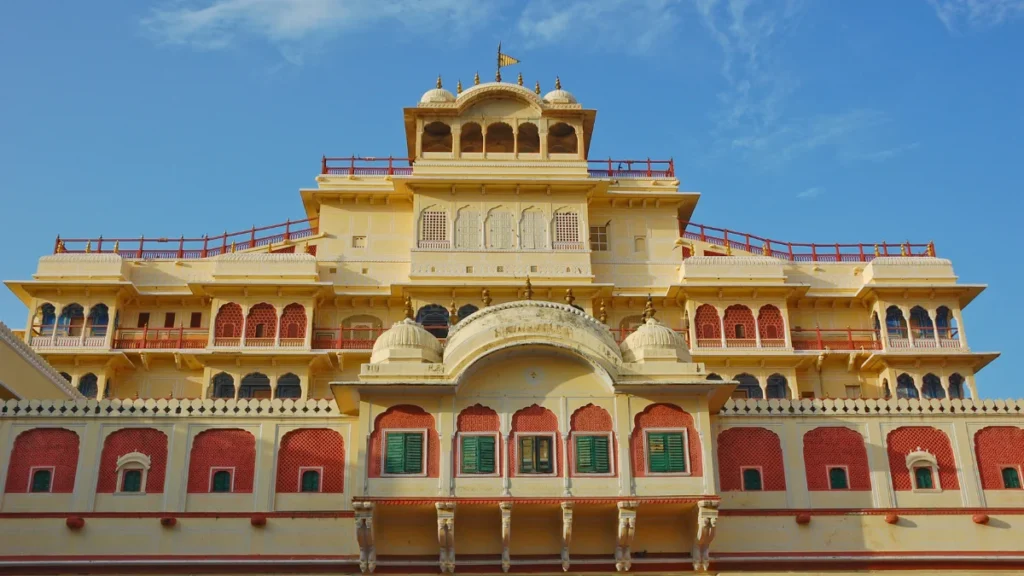
The Chandra Mahal, tucked away at the westernmost point of the City Palace, beckons with its beautiful charm. Visitors are greeted into a world decorated with exquisite mirror work, flower decorations, and paintings when entering via the Peacock Gate. With the eponymously called floors Sukh-Niwas, Ranga-Mandir, Pitam-Niwas, Chabi-Niwas, Shri-Niwas, and Mukut Mahal, this seven-story wonder reveals its majesty. The ground floor of Chandra Mahal becomes a museum, while the majority of the building houses the regal family’s descendants. Carpets, manuscripts, and other royal artefacts are housed here, providing a fascinating look into the rich history that characterises the Chandra Mahal at City Palace Jaipur.
City Palace Jaipur Timings
This regal palace is open from 09.30 A.M. to 05.30 P.M. It is closed on the second day of Holi, i.e., Dhulandi.
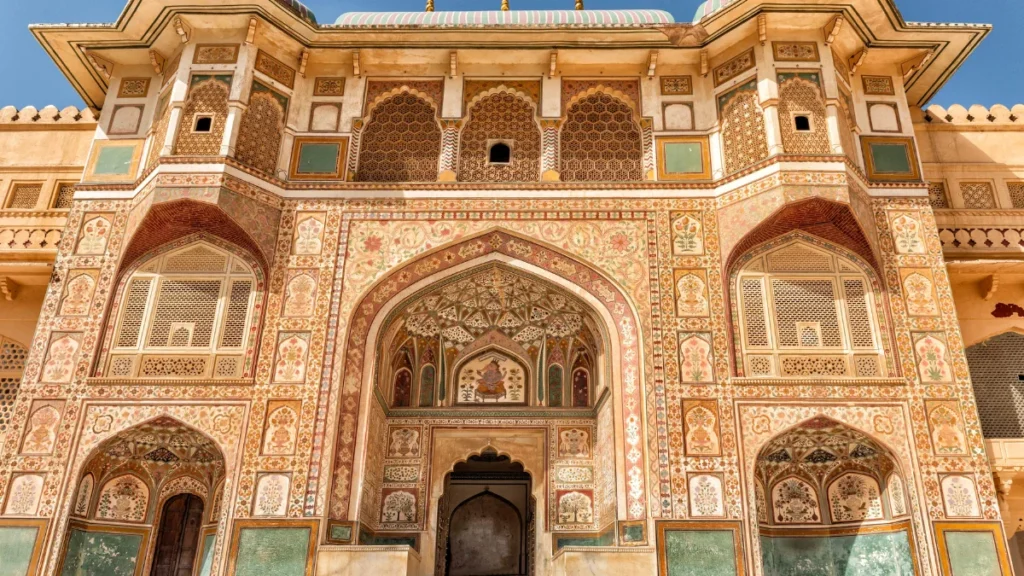
City Palace Jaipur Entry Fee
You can book your tickets for the visit from their e-ticket website (https://thecitypalacejaipur.com/book-ticket) or directly at the offline counter. Two types of tickets are available – one for the museum (only City Palace Jaipur) and one composite ticket that includes entry to the museum, Jaigarh Fort, and the Cenotaphs.
| Museum Ticket | Composite Ticket | ||
| Available for Indians Only | Indians | Foreigners | |
| Adult | 300 | 400 | 700 |
| Child | 150 | 250 | 400 |
| Senior Citizen (60+ Years) | 150 | 250 | N/A |
| Student | 150 | 250 | 400 |
| Defence Personnel and Veteran | 150 | 250 | N/A |
| Disabled | Free | Free | 430 |
| Other Amenities | For All | ||
| Golf Cart | 150 | ||
| Wheel Chair | Free | ||
| Child Activity Book | 50 | ||
| e-Rickshaw | 150 | ||
Best Time to Visit City Palace Jaipur
The perfect time to visit here would be in the winter (from November to February) due to the pleasant weather. The rest of the months in Rajasthan are humid and hot.
Conclusion
Located in the centre of Pink City, the City Palace Jaipur is a living example of the opulence of Rajasthan’s royal history in addition to being a historical marvel. Every area of the City Palace, from the elaborate Chandra Mahal Peacock Gate to the storied Diwan-i-Aam, captures the grandeur of a bygone period. The careful weaving of Mughal, Rajput, and European architectural forms results in a captivating tapestry, which Mubarak Mahal and the revered Govind Dev Ji Temple best show. Jaipur’s rich legacy is revealed to tourists as they walk through the luxurious hallways embellished with life-sized pictures and artefacts. Many captivating courtyards, museums, and luxury darbars are beyond the palace’s walls. Reaffirming the city’s reputation as a cultural gem, City Palace Jaipur stands as a light in this timeless embrace, welcoming people to experience its architectural richness and absorbing narratives. A trip to the City Palace Jaipur investigates an ongoing heritage reverberating through each courtyard and hallway of this magnificent regal complex rather than merely a step into the past.


